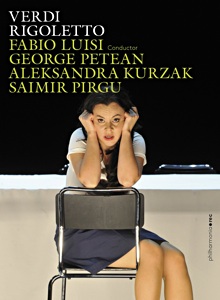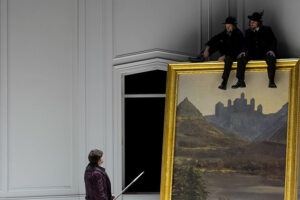
Newton’s Third Law of Motion states that for every action there is an equal and opposite reaction. This can be illustrated by two opposing kinds of opera fans: the kind who thinks that if it doesn’t happen in his backyard, it didn’t happen at all, and the other kind of fan for whom the grass is always greener on the other side of the fence.
The very small, very rich and very tax-free Opernhaus Zürich is often considered the Greenest Other Side of the Fence by opera aficionados who, well, don’t live in Zürich. They get the big stars before they become Big Stars (for everyone who heard Quinn Kelsey as Germont this fall/winter at the Met and thought he would be a wonderful Rigoletto, that was so two years ago in Zürich). They get the Big Stars who decide to only sing in Zürich (Cecilia Bartoli). And those tax breaks! It’s enough to make anyone mad with envy.
But for those stuck in the backwoods of the U.S. without the funds for yearly European vacations there is a small consolation prize that the grass isn’t always that green in Zürich. Their new DVD release of Rigoletto, “production” by Tatiana Gürbaca, is proof positive that awful productions happen in Zürich as well.
Gürbaca’s production features a long boardroom table and chairs set against a completely dark stage. If you think there’s some vaguely corporate metaphor in this production, you’d be wrong: directions are limited to “stand up” and “sit down” and “get on top of the table to sing.” Costumes are the usual “timeless” styles—a mix of business suit (Rigoletto), rustic hunting gear (Duke of Mantua), teenybopper (Gilda), and Burger King paper crowns (the chorus).
Who are any of these people, and why should we care? This production is no different from the old-style performances where singers parked in front of the prompter’s box while painted backdrops moved up and down. Replace “prompter’s box” with “table” and “painted backdrops” with “complete darkness” and you have this Rigoletto. You want to echo John Oliver’s refrain: “How is this even a thing?”
The characterization of the main characters takes all the heart from Verdi’s music. Rigoletto’s relationship with Gilda is explicitly creepy—in their opening duet they paw at each other like oversexed teens and in “Tutte le feste” and “Si vendetta” Rigoletto is a knife-wielding psycho. Even the final duet is played as a flashback with Gilda being replaced by a double of Gilda’s Mom. So Rigoletto inadvertently killed Gilda’s mom as well? I don’t get it.
They always say the devil is in the details and one little detail about this production encapsulated why it didn’t work: after being raped by the Duke, Gilda of course stumbles onstage. Kurzak has the bed head, and the purple negligee. But she’s also wearing very silky, high-end Kate-Middleton-style stockings. You know, the shimmery kind that makes it clear that you’re the sort of woman who can afford shimmery silk stockings. Um … wouldn’t that be the first thing to have come off during the encounter/rape?
It’s a shame because musical values of this Rigoletto are quite fine. Conductor Fabio Luisi opens up some of the cuts that are still standard in many Rigoletto productions. He leads the orchestra with his usual sweep (although he can sound ponderous).
And George Petean in the title role is vocally excellent in every way. He can really sing, not just bark and snarl. He has a slightly gravelly, inaudible lower register and doesn’t interpolate the expected high notes but it’s good to hear a baritone with such a ripe, healthy core to his voice. I like that he sang “Pari siamo” in an introspective, conversational way. The only thing is that his voice doesn’t have the Leonard Warren-like thunder for moments like “Cortigiani” but whatever, I’ll take this over Plamingo or Lucic any day.
Aleksandra Kurzak (Gilda) really has so many things going for her: an attractive timbre, a pretty face, and a refreshingly clean approach to the music. It’s nice to hear the cadenza of “Caro nome” so well articulated, neat trill and all. With that being said, I wonder how long she can sing these ingenue type roles because the one thing she lacks is a secure upper register. Her top is a penny whistle scream, the embodiment of “white tone.” She also exudes a worldly sophistication that doesn’t quite work in this role. Very musical singer, very talented, but I don’t think this is the role to showcase her talents.
Saimur Pirgu (Duke) is for some strange reason ubiquitous nowadays. I wonder why. He’s cute, and that’s about it. The voice is an unattractive, unremarkable lyric tenor. He has some squillo in his upper register and as I said, looks cute. The B natural at the end of “La donna è mobile” veers wildly off pitch. But he holds it for a long time.
The supporting roles are below average. Judith Schmid (Maddalena) is one those mezzos with a completely bottled, muffled sound. Monterone (Valeriy Murga) has a bad case of Wobbling Bass Syndrome. Sparafucile (Andrea Mastroni) is pretty good.
The good news is that this video release joins the very full ranks of unsatisfactory Rigolettos preserved on film. As of now, Rigoletto is still a Masterpiece in Search of a Great Video.
























Comments